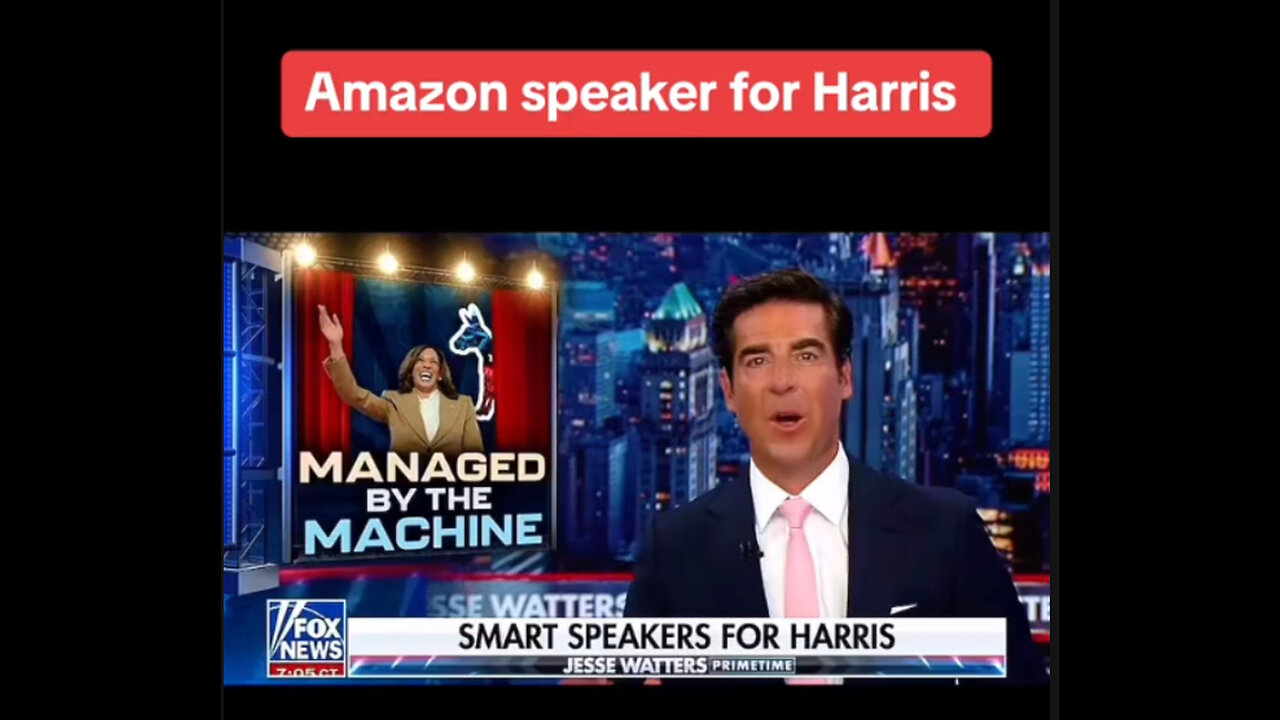Premium Only Content

Alexa and Political Bias: The Growing Concerns Over AI’s Influence on Public Opinion
As smart assistants like Amazon’s Alexa become integral to daily life, offering everything from weather updates to music playlists, their role in shaping how we access information has become more pronounced. However, when these devices step into the realm of politics, concerns about bias and manipulation arise. A recent incident involving Alexa and its responses to political questions has sparked a debate about the neutrality of AI systems and whether they can truly remain impartial.
The Incident: Alexa’s Contradictory Responses
It all started when a woman asked Alexa a seemingly straightforward question: “Why should I vote for Donald Trump?” Alexa’s response was surprising:
“I cannot provide content that promotes a specific political party or candidate.”
However, when the woman followed up with a question about Kamala Harris, the response was dramatically different. Alexa listed Harris’s accomplishments and her historic role as the first female vice president, along with a focus on progressive policies. This raised immediate concerns about political bias in Alexa’s programming, highlighting an apparent preference for one political figure over another.
The “Glitch” or a Deeper Problem?
Amazon was quick to respond, claiming that the discrepancy was a glitch that had since been resolved. However, critics argue that this explanation only scratches the surface. Many believe that bias in AI systems isn’t just a one-off issue but a systemic problem stemming from the data these systems are built on. If an AI assistant like Alexa can provide a glowing review of one political figure while deflecting questions about another, what does that say about the integrity of AI algorithms?
This incident is particularly concerning given that AI systems are increasingly becoming trusted sources of information. If these systems are inadvertently promoting certain ideologies or political figures, they could subtly influence public opinion, whether through deliberate programming or unintended bias in their training data.
The Role of Big Tech in Shaping Political Discourse
The broader issue here is the growing role of Big Tech in shaping political narratives. Companies like Amazon, Google, and Facebook have a monopoly over information and, consequently, hold unprecedented power to shape public perception. With Alexa’s vast reach, the possibility of political bias slipping into the algorithms that deliver news and political insights is troubling.
The algorithms that drive AI assistants like Alexa are trained on vast amounts of data, but this data is often skewed by the political leanings of the sources that dominate the web. Additionally, corporate interests and special interest groups may influence which data sets are prioritized in AI training, potentially leading to biased outcomes.
This opens up broader ethical questions about the transparency of AI algorithms. When AI systems provide politically charged responses, are they truly reflecting neutral data, or are they influenced by the ideologies embedded within the information they are fed? The implications of AI bias go beyond this specific case—it calls into question the neutrality of AI in all areas of life, from healthcare to justice.
The Dangers of Algorithmic Bias in AI Systems
At the heart of this controversy is the concept of algorithmic bias. AI systems, by their nature, learn from patterns in data. If the data they’re trained on is biased, the output will reflect that bias. The challenge lies in the fact that bias in AI training data can be subtle, often reflecting societal or cultural prejudices that aren’t immediately visible. These biases can be compounded over time, leading to skewed or problematic responses from AI-driven systems.
When it comes to politics, this is particularly dangerous. Imagine millions of people relying on Alexa for their news and political insights, unaware that the responses they receive might be filtered through biased algorithms. In an era where misinformation is rampant, the last thing we need is AI systems that inadvertently (or worse, intentionally) promote political viewpoints.
Can AI Be Politically Neutral?
One of the biggest questions stemming from this incident is whether AI can ever truly be politically neutral. AI is, after all, a reflection of the data it is trained on, and if that data is biased, so too will be the AI’s output. The solution to this issue lies in increasing transparency around how AI systems are trained and ensuring that diverse data sets are used to mitigate bias.
Developers of AI systems like Alexa must prioritize neutrality, ensuring that their systems do not unintentionally promote certain ideologies or political figures. This requires rigorous human oversight, the implementation of transparent algorithms, and the use of broad, diverse data sets that represent a wide range of viewpoints.
At the same time, consumers must be aware of the limitations of AI systems and recognize that even the most sophisticated algorithms are not free from bias. As AI continues to play an increasingly central role in our lives, understanding its inherent flaws is critical to using it responsibly.
The Future of AI in Political Discourse
As AI systems become more integrated into our lives, the potential for political manipulation through technology becomes a real concern. Whether through intentional bias or algorithmic limitations, AI has the power to influence public opinion on a scale never seen before. This is why it is crucial that we demand accountability and transparency from the tech companies that develop these systems.
It’s not just about fixing glitches—it’s about ensuring that AI is held to the highest standards of objectivity and fairness. The future of political discourse in an increasingly tech-driven world depends on it.
Conclusion: Navigating the Future of AI and Politics
The incident involving Alexa’s politically charged responses serves as a wake-up call about the growing influence of AI in shaping political narratives. As we move forward, it’s essential to scrutinize the systems we rely on for information, recognizing that bias, whether intentional or not, can have profound implications.
If AI is to play a role in our political landscape, we must ensure that it is as objective as possible, free from the biases that can shape the future of political discourse. The stakes are high, and Big Tech must be held accountable for how their algorithms shape the world around us.
-
 5:42
5:42
FragmentsOfTruth
1 day agoUnanswered Questions: The Mysteries and Anomalies of 9/11 Evidence
2403 -
 4:56
4:56
Tactical Advisor
1 hour agoPSA X5.7 Update | Shot Show 2025
5.14K3 -
![🔴[LIVE TRADING] Trump Addresses WEF || The MK Show](https://1a-1791.com/video/fwe1/84/s8/1/B/k/0/3/Bk03w.0kob.5-small-LIVE-TRADING-New-Highs-Inco.jpg) LIVE
LIVE
Matt Kohrs
9 hours ago🔴[LIVE TRADING] Trump Addresses WEF || The MK Show
1,585 watching -
 34:27
34:27
Rethinking the Dollar
1 hour agoThursday Morning Check-In: Trump Backlash & DOGE Savings Added To Debt Clock
9.41K1 -
 33:37
33:37
BonginoReport
5 hours agoGen Z Commies Are Plotting Violent Revolution Against Trump (Ep.124) - 01/23/2025
70.8K116 -
 LIVE
LIVE
Vigilant News Network
11 hours agoElon ATTACKS Stargate Project.. Is he RIGHT? | The Daily Dose
759 watching -
 1:05:34
1:05:34
2 MIKES LIVE
3 hours agoTHE MIKE SCHWARTZ SHOW with DR. MICHAEL J SCHWARTZ 01-23-2025
26.3K -
 1:31:27
1:31:27
Film Threat
16 hours agoLIVE OSCAR NOMINATIONS 2025 REACTION! HOLLYWOOD ON FIRE? | Academy Awards | Film Threat Awards
35.8K1 -
 1:23:45
1:23:45
Game On!
15 hours ago $3.90 earnedTom Brady critical of Patrick Mahomes abusing NFL sliding rules!
50.8K5 -
 6:01
6:01
Dr. Nick Zyrowski
1 day agoIs Beef Tallow healthy? Here Is How I Use It...
72.3K24